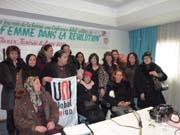UNI works with unions building a new future in Tunisia

UNI SCORE Head of Department Adriana Rosenzvaig is in Tunis for International Women’s Day where she met with women members from UNI affiliates to hear about the issues they are facing and to discuss with union leadership how to address. The women wore t-shirts that said, “I am free. I am the daughter of freedom.”
The UNI affiliates in Tunisia presented Rosenzvaig with a plan to work with UNI and to work together to provide support for collective bargaining; signing up new members who are expected to join unions due to the changes in subcontracting regulations; and to increase the capacity of the unions. They will also strategise together on their dealings with multinationals and on a plan to organize call centres.
“Our affiliates in Tunisia are Breaking Through,” Rosenzvaig said. “They have made incredible changes to the political and economic landscape of their country and we will help them ensure that working people reap the benefits of these monumental changes.”
The unions said they welcomed the support from UNI and General Secretary Philip Jennings for Tunisian workers.
“UNI is committed to the workers and unions of Tunisia and we offer global support for their work to build a strong democracy,” said UNI General Secretary Philip Jennings. “The unions are not only leading the rebuilding of their government, they are also fighting for-- and winning-- rights for workers.”
Mongi Abderrahim, general secretary of the professional and service workers’ union (FGPS), is one of the most active leaders in dealing with a change in the situation for the outsourced workers.
"In particular in the sectors of cleaning and security, workers were under extremely bad conditions imposed by contracts that in most cases were illegal," Abderrahim said. "Now, under a new national decree, thousands of workers will have a fixed contract."
In a few days, UNI affiliates will launch a liaison council to better coordinate their activities in Tunisia and publicise their plans to work together and to rebuild the country’s economy.
Jellali Abdelhamid, general secretary of the finance workers’ union (FGBEF) and Vice President of UNI Africa, said the focus will be on union rights —especially the right to strike— and gender equality.
“The unions from Tunisia and UNI are standing together with all the unions in the Arab world to fight for democracy, autonomy, union rights, human rights and gender rights,” Abdelhamid said.
UNI plans to visit other countries in the MENA region in the coming weeks.
While in Tunisia, Rosenzvaig also met with the Tunisian trade union centre General Secretary Abdessalem Jerad to congratulate the UGTT with its role leading the democratic revolution and to express UNI’s solidarity with the Tunisian Revolution and its support for the workers and unions in the country.
Since January the UGTT has gained tens of thousands of new members, in particular in the private sector of the economy, due in part to the enthusiasm from young people for the unions and the effects of the subcontracting regulations.
The UGTT is committed to its role in building a new government that is a real democracy that protects human rights, basic freedoms and gender equality, Jerad said. The trade union centre is part of the Council for the Protection of the Revolution and the Institutional Council that will prepare the elections and new constitution.

